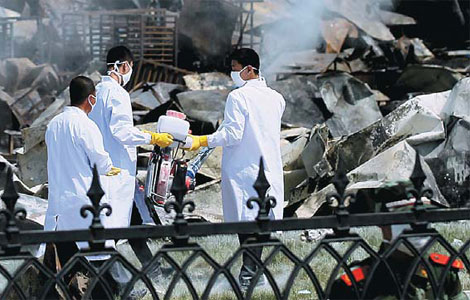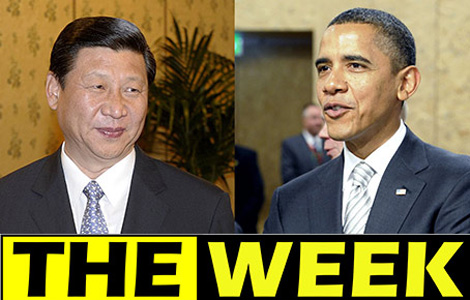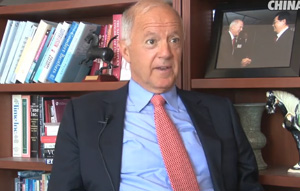Opportunity knocks
Updated: 2013-06-07 02:20
By Chen Xiangyang (China Daily)
|
|||||||||||
China and the US should make joint efforts to overcome their differences and work together for world peace and prosperity
After wrapping up his trip to Trinidad and Tobago, Costa Rica and Mexico, President Xi Jinping will meet US President Barack Obama on June 7 and 8 at the Annenberg estate in Rancho Mirage, California. The meeting, coming amid a complex and changing international security and economic situation, has attracted worldwide attention, with the international community waiting to see whether China and the United States can balance their cooperation and competition and jointly find a way to work together and develop their relationship.
Where are relations between China and the US heading? While meeting with visiting US Secretary of State John Kerry on April 13, Xi called on both countries to take a strategic and long-term view of their relations, carry out dialogue and cooperation with a positive attitude, deal with their differences with mutual respect and blaze a trail for a new type of relations between major powers; one that features equality, mutual trust, tolerance, mutual learning, cooperation and common prosperity.
On May 27, President Xi met with the US National Security Advisor Thomas E. Donilon and noted that both sides should make joint efforts to build a cooperative partnership and a new type of relationship between two major powers, as this would be in the interests of both peoples and the peoples of the world.
Xi has said that he believes if both sides make the necessary efforts, the meeting with President Obama will inject new vitality into the development of the relationship between China and the US, which will promote peace, stability and prosperity in the Asia-Pacific region and the world. Donilon said that the US and China share extensive common interests and the US side is firmly committed to properly handling the differences between the two sides and working with China to strengthen exchanges and cooperation and efforts to address the many global challenges.
It is expected that during the meeting, Xi and Obama will exchange extensive and in-depth views on major strategic issues of mutual interest to deepen understanding, enhance mutual trust, and promote pragmatic cooperation, laying a solid foundation for establishing a new type of relationship between two great powers. To this end, Xi will emphasize the strategic significance of the two countries building a new type of relationship.
China and the US share extensive common interests and have great potential for cooperation in dealing with all kinds of global challenges and regional hotspot issues. The two countries will continue to promote exchanges and cooperation in trade, energy, environmental protection, culture and other areas and will strengthen communication and coordination on issues such as the Korean Peninsula, Iran's nuclear program, Syria and the situation in the Middle East, the sluggish global economic recovery, climate change and other global challenges.
However, some stubborn differences and problems between the two powers need effective management and proper handling. It is always easier to say than to do, and the final establishment of a new type of Sino-US relationship must withstand three major tests.
The first is the geostrategic balance between China and the US in the Asia-Pacific. Washington's strategic rebalancing has further complicated the maritime territorial disputes between China and some of its neighbors. The US' inconsistency in words and deeds over China's bilateral disputes with neighbors has enabled "third-party factors" to directly challenge relations between China and the US.
The second is the competition for markets and the right to work out international trade rules. The US is pushing forward the Trans-Pacific Partnership with Australia, Brunei, Chile, Canada, Japan, Malaysia, New Zealand, Peru, Singapore, South Korea, and Vietnam, and the Transatlantic Trade and Investment Partnership with the European Union in an attempt to suppress China's increasing international market share.
The third is establishing appropriate standards for cyberspace. Prior to the meeting, the US media are playing up the "Chinese hacker threat" in an attempt to put pressure on China. Speaking at the security conference, the Shangri-La Dialogue in Singapore on June 1, US Defense Secretary Chuck Hagel publicly blamed the Chinese government and military for computer-based attacks on US government and corporate networks.
Beijing should be fully aware of the complexity of the strategic development in a new period, and steadily promote its diplomatic grand strategy, including its relations with the US, with a sober frame of mind and scientific attitude.
The author is deputy director of World Politics Research Institute, affiliated to the China Institutes of Contemporary International Relations.
Related Stories
Xi's Latin America tour deepens ties 2013-06-07 00:15
China to protect investors' interests: Xi 2013-06-06 18:51
Xi-Obama summit 'strategic, historic meeting' 2013-06-06 16:45
Xi calls for more exchanges on legislatures 2013-06-06 05:45
Xi delivers speech on ties with Mexico, LatAm 2013-06-06 04:50
Today's Top News
EU wine producers surprised by investigation
China to protect investors' interests: President Xi
DPRK proposes meeting with ROK on Sunday
Xi arrives in California for summit with Obama
China's economy might be No 1 in 2030
Probe of EU wine 'not retaliation'
355,000 parents have lost only children
Russian President Putin, wife announce divorce
Hot Topics
Lunar probe , China growth forecasts, Emission rules get tougher, China seen through 'colored lens', International board,
Editor's Picks

|

|

|

|

|

|





